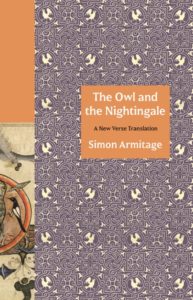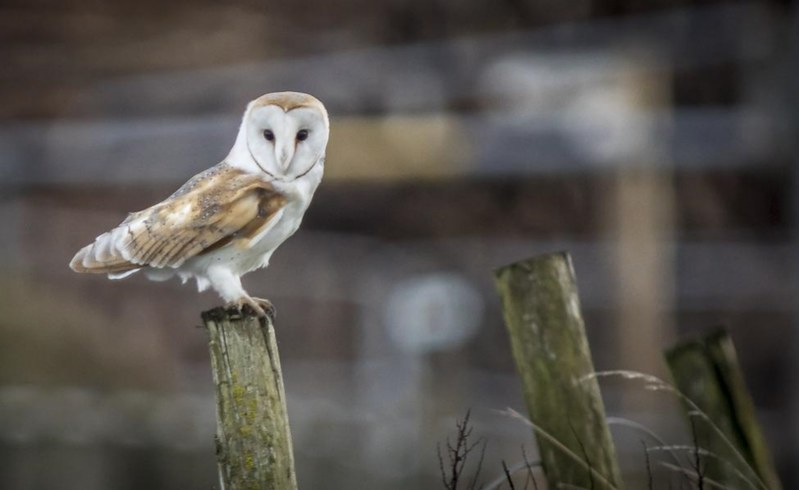Simon Armitage translates a medieval classic with a mystery provenance
The Owl and the Nightingale is one of the most famous poems to have emerged from medieval England. The story is straightforward. Two birds, a nightingale and an owl, face off across a clearing. The nightingale starts an argument that seems less an argument and more a stream of invective and insults aimed at the common owl (emphasis on “common”). The owl, taken aback by the verbal assault, gives back in kind, but she also seems to argue a more reasoned response.
While reading this poem, it’s difficult not to imagine the two birds individually sporting colors of blue and red, one arguing from an elitist position and the other from that of the commoner. The only thing the nightingale doesn’t call the owl is “deplorable,” but you get the idea. Both birds make their arguments from Christian teaching; both constantly violate that teaching in how they argue. The nightingale, however, recognizes the merit in much of what the owl is saying, but is determined to yield no ground. The poem ends with both flying off to have the argument settled once and for all by Master Nicholas.
It’s the earliest example of debate poetry, sometimes called a verse contest, in Middle English. We know that the poem bears both Anglo-Saxon and French influences, which place it after the Norman Invasion of 1066. The poem is composed of 1,800 lines written in iambic tetrameter, the most common poetic meter in English.
But from that point, the poem’s provenance gets murky.
The author is unknown. The poem contains a reference to a Master Nicholas of Guildford, who seems to serve as a final arbiter, at least in the minds of the two birds. No one knows who that might have been.
The approximate date is unknown. It might be 12th century, and it might be 13th century; a reference to a King Henry or Henri inconveniently omits which Henry is being cited.
The place of origin is unknown. We can safely say it was somewhere in England, but arguments have been made for Kent, Dorset, Wessex, the Midlands, and the Home Counties surrounding London.
Two copies of the poem exist, one at the British Library in London and the other at Jesus College, Oxford. Both are believed to have been copied from the same text. The British Library text is written in two different hands in English and “Anglo Norman.” The Oxford text is in three languages — English, Anglo Norman, and Latin — and written in the same hand.
British Poet Laureate Simon Armitage has published The Owl and the Nightingale: A New Verse Translation, and it’s an entertaining, highly readable version that remains true to the often rancorous debate between the two birds. One liberty he’s taken is to substitute his own name for that of Master Nicholas. The poet has been focusing a considerable amount of his literary work on translating some of the classics of English poetry, including Sir Gawain and the Green Knight, Pearl, and The Death of King Arthur.
This is how Armitage begins his translation of The Owl and the Nightingale.

a mighty war of words disturb
a peaceful & secluded dale;
between an Owl & Nightingale
barbed comments flew, now soft, now loud,
but always heartfelt, wounding, proud.
The birds, both swollen up with anger,
hurled abuse at one another,
taking turns to slate & curse
what in the other bird was worst,
with insults being especially strong
when rubbishing the other’s song.
The Nightingale took up proceedings
from the corner of a clearing,
perching on a handsome bough
with blossoms hanging down & round,
beside a densely knotted hedge
entwined with reeds & bright green sedge.
She gloried in that branch; it formed
a kind of stage, & she performed
the music of her repertoire
as if she played a pipe or harp,
as if each bright, melodious note
were not the product of a throat.
There was, nearby, a tree-stump where
the owl intoned her hourly prayers,
an ancient ivy-covered bole
the Owl had claimed as her abode.

Simon Armitage
Armitage has published several collections of poetry, including The Dead Sea Poems (1998), Kid (1999), Killing Time (1999), The Universal Home Doctor (2004), Book of Matches (2010), Seeing Stars (2011), The Shout (2014), Paper Aeroplane: Selected Poems 1989-2014 (2015), and The Unaccompanied (2017). He’s written accounts of travels in Britain, including Walking Home: A Poet’s Journey (2013) and Walking Away (2016), and two novels, Little Green Man (2001) and White Stuff (2005). He’s also published translations and retellings of several classic works, including Sir Gawain and the Green Knight, The Odyssey: A Dramatic Retelling of Homer’s Epic (2008), The Death of King Arthur (2012), The Story of the Iliad (2015), and The Last Days of Troy (2016).
This faithful translation of The Owl and the Nightingale by Armitage accomplishes two things. It provides evidence of the rich legacy we have in English literature. And it suggests, rather subtly, that today’s rancorous cultural and political arguments have been around for at least a thousand years. Some things about the human condition always seem to stay the same.
Related:
The Enduring Appeal of “Sir Gawain and the Green Knight”
Poets and Poems: Simon Armitage Translates “Pearl”
Simon Armitage, the New British Poet Laureate
Photo by Martyn Fletcher, Creative Commons, via Flickr. Post by Glynn Young.
How to Read a Poem uses images like the mouse, the hive, the switch (from the Billy Collins poem)—to guide readers into new ways of understanding poems. Anthology included.
“I require all our incoming poetry students—in the MFA I direct—to buy and read this book.”
—Jeanetta Calhoun Mish
- Poets and Poems: Donna Vorreyer and “Unrivered” - October 7, 2025
- Poet Sidney Lanier and the Lost Cause - October 2, 2025
- Poets and Poems: A.J. Thibault and “We Lack a Word” - September 30, 2025



Mary Sayler says
Interesting article, Glynn. Thanks. Sometimes I get discouraged by the self-centered expressions, rampantly written and referred to as poetry, when we have such a rich heritage of English literature.
Glynn says
Armitage seems to be on a mission to revive medieval classics. His position as poet laureate puts him in a good position to do that. And, as you point out, we do have a rich heritage of English literature, which many dismiss today as “irrelevant.” But works like “The Owl and the Nightingale” speak to the culture today just as much as they did when they were first written. (It’s one reason why they last.)